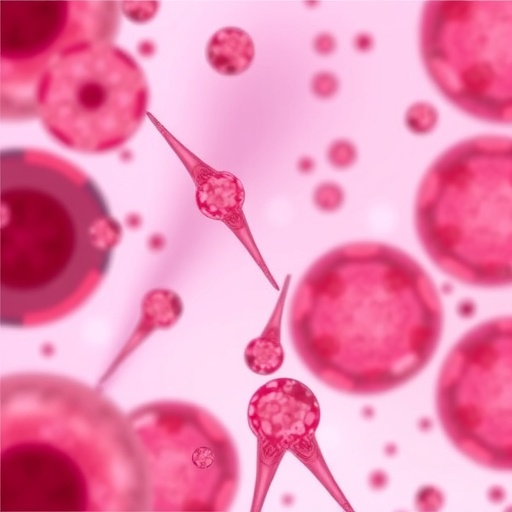In a groundbreaking study recently published in Clinical Proteomics, researchers delved into the astonishing capabilities of mesenchymal stem cells (MSCs) and their conditioned media in repairing the damage inflicted upon human umbilical vein endothelial cells (HUVECs) due to high glucose levels. This exploration comes at a crucial time when the global prevalence of diabetes continues to rise alarmingly, making the understanding of its implications on vascular health more urgent than ever. The study conducted by Guo et al. sheds light on the potential of regenerative medicine tools in combating the detrimental effects of diabetes-related endothelial dysfunction.
Endothelial cells play a pivotal role in maintaining vascular homeostasis, and their dysfunction is recognized as a significant contributor to the complications associated with diabetes. High glucose concentrations can lead to endothelial cell damage, triggering a cascade of events that result in inflammation, impaired vasodilation, and increased arterial stiffness. Such pathophysiological changes can ultimately lead to severe cardiovascular conditions. Guo and colleagues set out to investigate how MSCs and their secretions might mitigate this damage, potentially paving the way for novel therapeutic strategies in diabetic patients.
The researchers utilized conditioned media derived from MSCs obtained from various sources, including bone marrow, adipose tissue, and umbilical cord tissue. The objective was to evaluate how these different sources might influence the regenerative capacities of the MSC-derived factors on HUVECs exposed to high glucose conditions. Previous studies had indicated that MSCs are not only adept at differentiating into various cell types but also devastatingly effective secretors of bioactive molecules, thereby making them ideal candidates for tissue repair.
Their experimental design included subjecting HUVECs to hyperglycemic conditions, simulating the environment typically observed in diabetic individuals. The MSC-derived conditioned media were then introduced to these cells to assess their repair capabilities. The scientists meticulously measured various endpoints, including cell viability, proliferation, and specific markers indicative of endothelial function, to determine the extent of damage reversal facilitated by the MSC secretome.
One of the most striking findings from the study was the observation that conditioned media from adipose-derived MSCs exhibited superior protective effects on HUVECs compared to other sources. The data suggested that the secretions from these cells promoted significant cell survival and enhanced metabolic activity, which is crucial for maintaining endothelial homeostasis. This differential efficacy hints at the potential optimization of MSC applications in clinical settings, particularly in formulating therapeutic interventions tailored to individual patient requirements based on stem cell source.
Further analysis revealed that various cytokines and growth factors present in the MSC-conditioned media contributed to the observed protective effects. Key players in this biological ballet included vascular endothelial growth factor (VEGF) and interleukin-6 (IL-6), both known for their roles in endothelial function and repair processes. The study meticulously detailed how these factors not only promote cell survival but also stimulate angiogenesis, the formation of new blood vessels, which is critical in restoring vascular health in diabetic conditions.
An additional layer of complexity was added when the researchers began exploring the signaling pathways activated in the HUVECs upon treatment with MSC-conditioned media. Initial findings pointed towards the involvement of the PI3K/Akt signaling pathway, which is pivotal in mediating cell survival and growth responses. This insight into molecular mechanisms provides a valuable understanding of how MSCs exert their beneficial effects and lays the groundwork for future research aimed at targeted modulation of these pathways to enhance therapeutic outcomes further.
The implications of Guo et al.’s work extend beyond basic science and unravel a treasure trove of potential applications in regenerative medicine. The therapeutic application of MSCs could significantly improve the management of diabetic complications, a sphere that has historically been fraught with limited options. With the burgeoning field of cell therapies, the findings of this study could catalyze advancements in developing MSC-based treatments that are not only more efficacious but also target the fundamental pathological processes seen in diabetes.
Moreover, this exploration showcases the importance of an interdisciplinary approach, weaving together insights from molecular biology, regenerative medicine, and clinical therapeutics. By understanding the biological underpinnings of MSC action, researchers and clinicians can better position themselves to integrate these findings into everyday clinical practice. It also emphasizes the need for continued collaborative research efforts, drawing from varied scientific disciplines to innovate solutions to complex health challenges.
Looking ahead, the next steps in this line of inquiry ought to focus on in vivo models that can further characterize the efficacy of MSC-conditioned media in real physiological contexts. Translating these promising findings from bench to bedside requires comprehensive investigations to ascertain not only the effectiveness but also the safety and dosage parameters of potential stem cell-derived therapies. Ethical considerations surrounding stem cell use also remain paramount and should be part of any future research trajectory.
In conclusion, Guo et al.’s research underscores the promising potential of MSCs as a viable strategy against endothelial dysfunction stemming from high glucose levels in diabetic conditions. This avenue holds the promise of advancing treatments that could significantly enhance the quality of life for millions of individuals grappling with diabetes. As the world continues to tackle the escalating diabetes epidemic, findings such as these illuminate the path toward innovative and practical therapeutic approaches, promising a brighter future for vascular health and regenerative medicine.
Subject of Research: Mesenchymal stem cell conditioned media’s effect on endothelial cells damaged by high glucose.
Article Title: Repair effect analysis of mesenchymal stem cell conditioned media from multiple sources on HUVECs damaged by high glucose.
Article References:
Guo, X., Wang, J., Su, R. et al. Repair effect analysis of mesenchymal stem cell conditioned media from multiple sources on HUVECs damaged by high glucose. Clin Proteom 21, 69 (2024). https://doi.org/10.1186/s12014-024-09521-5
Image Credits: AI Generated
DOI:
Keywords: Mesenchymal stem cells, conditioned media, endothelial cells, high glucose, diabetes, vascular health, regenerative medicine, cytokines, growth factors, angiogenesis.




